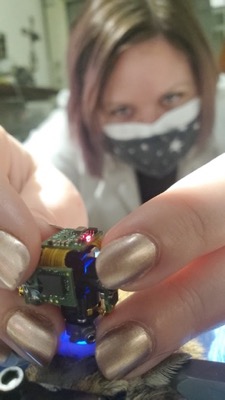I’d like to post the following ad for a postdoctoral position. Let me know if you need anything else, or different formatting. Thank you!
Merri J. Rosen, Ph.D.
Associate Professor, Department of Anatomy & Neurobiology
Director, Hearing Research Group
NEOMED (Northeast Ohio Medical University)
Office: 330.325.6516 | Lab: 330.325.6633
NIH-funded Postdoctoral Position
Early-life stress effects on auditory perception and the brain
 Rosen
Lab, Hearing
Research Group
Rosen
Lab, Hearing
Research Group
Department of Anatomy & Neurobiology
NEOMED (Northeast Ohio Medical University)
It is well-known that hearing  problems
in kids can induce later deficits in understanding complex sounds, such as rapid speech in background noise. Our lab is the first to show that stress during development can cause similar problems. Based on our data, early-life stress affects auditory perception
and neural activity throughout the auditory pathway. Furthermore, early hearing loss and stress together are much worse for auditory perception than either one alone, yet the mechanisms underlying these deficits are unknown. We’re funded by the NIDCD to study
how early-life stress and hearing loss affect the perception of rapid changes in sound, and the underlying neural mechanisms.
problems
in kids can induce later deficits in understanding complex sounds, such as rapid speech in background noise. Our lab is the first to show that stress during development can cause similar problems. Based on our data, early-life stress affects auditory perception
and neural activity throughout the auditory pathway. Furthermore, early hearing loss and stress together are much worse for auditory perception than either one alone, yet the mechanisms underlying these deficits are unknown. We’re funded by the NIDCD to study
how early-life stress and hearing loss affect the perception of rapid changes in sound, and the underlying neural mechanisms.
Our laboratory is
part of a very active auditory neuroscience Hearing
Research Group of ten laboratories,
with a strong training environment and funding record. We have combined expertise in multiple approaches (optogenetics; 2-photon slice, intracellular in vivo, and chronic neurophysiology; psychophysics; immunohistochemistry;
neuroanatomy) as well as across brain regions (auditory brainstem, midbrain, cortex, amygdala). The group is highly interactive and accessible, and the successful candidate will benefit from this expertise and from ongoing collaborations within the group.
 This
project uses calcium imaging of specific cell types, and multi-site electrophysiology in behaving Mongolian gerbils, applying computational analyses to evaluate population codes for auditory perception. There
is flexibility to explore questions arising from incoming data, and opportunities to apply additional techniques.
This
project uses calcium imaging of specific cell types, and multi-site electrophysiology in behaving Mongolian gerbils, applying computational analyses to evaluate population codes for auditory perception. There
is flexibility to explore questions arising from incoming data, and opportunities to apply additional techniques.
The ideal candidate has experience with some/all of the following: electrophysiological recording, calcium imaging, operant conditioning, animal surgeries,
and/or computational/ programming skills / Matlab. Comfort with animals is essential. The position is available immediately for three years, with possible extension. Funding is at NIH pay scale.
For more information, contact Dr.
Merri Rosen with a CV and statement
of research interests.